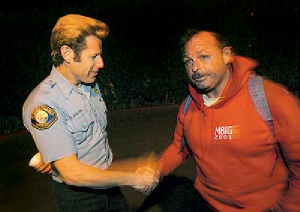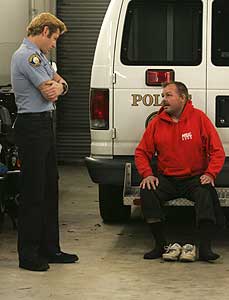|
‘Drunk in Public,’ a documentary about the alcohol-soaked trials of a serial arrestee, forces
filmmaker to evaluate his own life.
By JENNIFER MUIR - THE ORANGE COUNTY REGISTER
NEWPORT BEACH
The
jailer turns the key, pulls open the steel door.
The shivering inmate looks up from the slice of bread in his hand, flashes
a toothless smile.
“David!” he says, hobbling toward the jailer, his shaking hand out. “I’d
like to tell you, sir, I like your new haircut. It’s very sophisticated in its illogical content.”
David
Sperling is used to deciphering the inmate’s gibberish. He’s also used to hearing compliments about his hair.
And when the man asks – “Do I look a lot better?” – Sperling knows he’d appreciate a compliment
in return.
So, Sperling ignores the mud-caked pants, rotted teeth, stench of urine.
“You
looked trimmed up,” Sperling says.
It’s true. Mark David Allen looks better today than he
has during much of the 12 years he’s been the subject of Sperling’s film documentary “Drunk in Public.”
So today – the day of Allen’s 404th misdemeanor arrest – Sperling seems hopeful.
“I’m
going to walk down Jamboree Road and turn right on Pacific Coast Highway, and then all of the sudden, here’s the liquor
store,” Allen says, pulling on socks while Sperling, 37, releases him from the Newport Beach Jail. “And I have
to decide, should I go get pickled, or should I go read my AA book?”

|
| Photo by Kevin Sullivan - O.C. Register |
A GOOD REBEL
Sperling met Allen in 1994. He had just
been hired as a Newport Beach jailer but he dreamed of being a writer and filmmaker. Sperling says his mother had tried to
persuade him to go to film school. But Sperling treated her suggestion the same as the others he considered irresponsible
– like when she encouraged him to drink, smoke or “screw anything that moves.”
He
got a degree in social ecology from UC Irvine instead. He rebelled by being good.
Allen was good at
rebelling, too. Back then, he had been arrested nearly 100 times.
All the jailers knew him as a washed-up
surfer with a sad story: His father drank himself to death when he was young. His mother moved to Oregon, leaving Allen in
his grandmother’s care. He attended Newport Harbor High in the late ’70s but didn’t graduate. Later, he
was the lone survivor of a car crash that killed several friends and put him in a coma for 37 days –likely causing the
seizure disorder he has today. He was homeless. He was a drunk.
Sperling was intrigued.
“A
hundred seemed like such a big number,” Sperling says. “It was fascinating to me. At what point does something
happen?”
That question became the basis of a documentary Sperling continues shooting today, a
film that later would force him to re-evaluate his measures of success and failure.
It didn’t
start out that way, though. It started out as a snapshot of Allen’s sad situation: Allen passed out in jail, Allen panhandling
at the beach, Allen hanging out at Channel Place Park. It started with Allen’s family and police talking about how he
had amassed so many arrests.
Sperling vowed not to stop filming until Allen either got sober or died.
But Allen disappeared that same year before Sperling could get his ending.
WASTED IN WAIKIKI
Five
years later, the rumors started flying: Allen had washed up dead on a beach. He was burned in the sugarcane fields by locals
in Hawaii.
Sperling had to know the truth. He had learned that Allen’s half-brother bought him
a plane ticket to Hawaii to give him a last shot at sobriety. So, Sperling caught a plane to Honolulu and told the cops Allen’s
story. Turns out, they were very familiar with Allen – they had arrested him 85 times.
Sperling
was canvassing a Waikiki beach when he spotted Allen sleeping on a park bench. He was bloated, bearded, toothless. Still,
he recognized his friend.
“Hey, bro!” Allen shouted when he woke up.
Sperling
bought him a burger. Shot some film. Then he flew home.
ONE-WAY TICKET HOME
Allen
soon followed. After Honolulu cops learned where Allen came from, they bought him a one-way ticket back, Sperling says.
So
the jailer continued filming Allen – his constant promises to go to meetings, his way of stringing together words as
if he’s reading the children’s word game Mad Libs. And Sperling grew more frustrated every day.
“How
many hundreds of thousands of dollars do the citizens have to pay?” Sperling wrote in June 2003 in his online journal
at www.furiouslove.com , “Paramedic costs, overtime ... ER bills, county jail bills – it’s endless.”
See,
every time Allen is arrested, he first has to be taken to Hoag Hospital to get medicine for his seizures so he won’t
get sick as soon as he starts to sober up. He’s usually released from jail after only six hours so he won’t have
a seizure there, where police can’t give him medicine. Sperling has added up all the booking fees, emergency-room costs,
housing and food, and estimates that every time Allen gets arrested, he costs taxpayers about $730. That’s not including
court fees and time spent dealing with him.
And it’s not like Newport Beach police are picking
on him, Sperling says. They have no choice but to haul him in when he’s passed out on someone’s porch or bloody
from falling face-first in the street.
So Sperling has spent thousands of hours trying to find solutions.
He’s called doctors, judges, rehabilitation centers. The closest he came to seeing Allen get sober was in 2000, when
Allen agreed to enroll in a six-month rehab program. He walked out after 11 days.
The problem is this:
Allen can’t be forced to get treatment. And he can’t be forcibly committed to a care facility unless a doctor
diagnoses him as gravely disabled and unable to care for himself, Sperling says. Even though Allen can barely speak coherently,
can’t find a job, can’t function without drinking, Sperling hasn’t been able to find a doctor to help.
CHANGES AFOOT
The
e-mail that changed things came on May 23rd.
Sperling screened early versions of “Drunk In Public”
at the Newport Beach Film Festival in 1997 and then in 2000. Since then, he’s given away about 40 copies of the DVD
and sold 20 online.
“Dave, great movie on MDA (Mark David Allen). ... Left me very sad. I have
decided to quit drinking as of 5/23.”
Sperling cried, stunned.
“OK,
I get it now,” he says. “Maybe it’s not just about getting him sober. Maybe it’s the person I become
dealing with him.”
Sperling can already see the changes: The patience, compassion and tolerance
he practices with Allen is spilling into the rest of his life, into the way he treats other inmates, the way he treats his
family and friends.
So as Allen hobbles away from the Newport Beach Jail after dark, Sperling shakes
his hand, hugs him goodbye. Then he watches him walk down Jamboree Road, sure he’ll choose the liquor store –
the 750-milliliter bottle of 100-proof blue label Smirnoff Vodka washed down with a Diet Dr Pepper – instead of his
little blue AA book.
Still, Sperling will keep on filming, keep on pulling for his friend. Because somewhere
along the way, he saw something in Allen that he respects. Even admires.
“He’s resilient,
doesn’t blame anyone else. He’s physically tough,” Sperling says. “Anytime I’ve ever had success
in my life, it’s because of those qualities.”

|
| Photo by Kevin Sullivan - O.C. Register |
|

